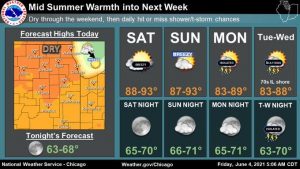Summer weather is upon us. Heating and cooling costs account for 50 percent of a home’s energy bills, according to the Department of Energy. Stay safe, cool and energy efficient.
Be safe. Raising your thermostat by a few degrees and using a ceiling fan can lower air conditioning costs over the summer. Just be smart about it—don’t raise the temperature to an unsafe level. Many utilities (ComEd, Ameren and MidAmerican) recommend setting it at about 76-78 degrees when you’re at home. Read our recent blog on setting the thermostat, and check out this Energy Star guide.
Schedule HVAC maintenance. Regularly schedule an appointment with an expert to check your equipment’s performance. An HVAC technician can tell if it’s time to replace your old cooling unit with a new energy-efficient model. (Newer ENERGY STAR units will result in at least a 15 percent gain in efficiency. There are more great tips on this page of the Energy Star website.)
Give your AC a break. Prevent hot air from seeping in by sealing the gaps around windows and doors. Shut blinds or shades during the daytime hours to prevent the sun from cooking your home and your air conditioner from working harder to cool it. At cooler times of the day (night and morning) or on milder, less humid days, open up windows and use screens to let the refreshing air come in.
Clean filters. Clean your air conditioning unit’s filter at least once every three months. It’s an easy way to improve the unit’s performance and to save energy. For more tips on maintaining your air conditioner, check out this Energy Department page.
Use fans. Fans alone aren’t adequate in a heat wave, but they can be used with an air conditioner—so you don’t have to blast the AC. Run a ceiling fan counter-clockwise, from your position looking up at it, to create a downdraft, and make sure to turn off your fan when you leave the room. (Fans cool people, not rooms.)
Avoid hot tasks. Delay heat-producing tasks, such as dishwashing, baking, or laundry, until the cooler night or early morning hours. Consider grilling out to keep the kitchen from overheating and your AC from over-working. If grilling isn’t for you, make meals in the microwave.
Shut it off. Turn off and unplug extra appliances that produce more heat and make your home hotter (TV, computers, laptops, lights), and make sure to unplug your phone charger.
Open windows. If it gets cool in the evening hours, consider opening windows and using screens to let the breeze in. Seal up the house again in the morning.
Drink plenty of water. Sip about four to eight glasses of fluids a day, but avoid too much alcohol or caffeine, which promotes dehydration.
Take the edge off. During intense heat, make sure to find an air-conditioned space, and take simple actions to get through your hottest moments. For temporary relief, use a spray bottle filled with cool water to apply a refreshing mist on your face. Soak your feet in cool water. Place ice cubes, wrapped in a wet fabric, on your “pulse points,” where the blood vessels are close to the skin: wrists, neck, the insides of your elbows, the tops of your feet and the inside of the ankles.
Be a good neighbor. Make sure you and your neighbors have a safe and cool place to stay. Illinois opens free cooling centers in times of extreme heat (find out where they are here). Many of those are open during business hours, although Tollway Oasis locations are open 24 hours a day. If a cooling center isn’t near you, remember shopping malls, public libraries and the homes of friends and family can be cool places of refuge.
The internet is filled with money-saving tips, just make sure you have good sources. Check out the Department of Energy’s summer tips and EnergyStar.gov. Also, for more tips, order a free copy of CUB’s Guide to Home Savings.


